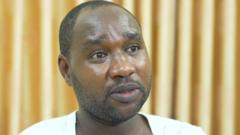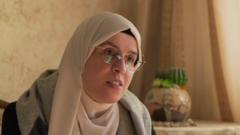Following his release from prison, Mubarak Bala expresses gratitude for his freedom while fearing for his life, highlighting the harsh realities faced by atheists in deeply religious Nigeria.
Nigerian Atheist Mubarak Bala Resumes Life in Hiding After Blasphemy Conviction

Nigerian Atheist Mubarak Bala Resumes Life in Hiding After Blasphemy Conviction
Mubarak Bala, a prominent Nigerian atheist, has been released from prison after four years but remains in hiding due to safety concerns.
Mubarak Bala, a notable Nigerian atheist, has recently been released from prison after spending over four years behind bars for blasphemy. At 40 years old, Bala is now living in a secure location, as his legal representatives fear for his safety following his controversial conviction.
Bala was sentenced after he confessed to 18 charges related to a Facebook post he shared in 2020, which many deemed offensive. In a unique interview with the BBC, he acknowledged, “The concern about my safety is always there,” while enjoying his first meal since gaining freedom, illustrating the profound impact of his imprisonment.
Nigeria, characterized by its deep religious convictions, is perilous for those perceived to insult religious beliefs, whether Islamic or Christian. The duality of Sharia law and secular law in northern states underscores the severity of such accusations. Bala, who abandoned Islam in 2014, reflected on his concerns during incarceration, fearing that prison guards or fellow inmates might target him due to his beliefs.
Upon his release from the prison in Abuja, Bala appeared weary yet elated, donning casual attire. He expressed wonderment at being free again, saying, “Everything is new to me.” He faced a lengthy sentence before an appeals court deemed the original 24-year term "excessive" and shortened it.
His arrest stemmed from a complaint filed by a group of lawyers regarding his social media commentary, leading to a tumultuous two years leading up to his unexpected guilty plea in 2022. While some were perplexed by this decision, Bala explained it was a means to alleviate the burden on his supporters. "I believe what I did saved not only my life, but people in Kano," he stated.
Bala’s conviction has drawn condemnation from human rights groups, inciting discussions on freedom of expression in Nigeria; his ordeal also resonated deeply within the nation’s small atheist community. “Thanks, that he’s out, but no thanks, because there’s a dent on him as if he committed a crime,” commented Leo Igwe, founder of the Humanist Association of Nigeria.
As he reintegrates into society, Bala is eager to reconnect with his young son, who was merely a few weeks old at the time of his imprisonment. Despite the risks he faces, he remains unrepentant, stating, “I always knew the worst would happen.” His unwavering commitment to activism underscores the ongoing struggle for freedom of belief in Nigeria.



















